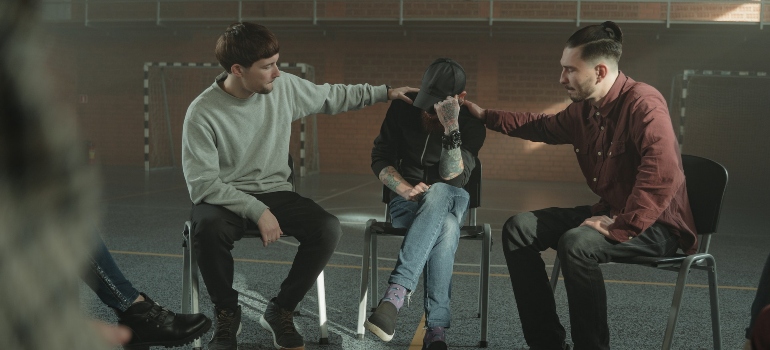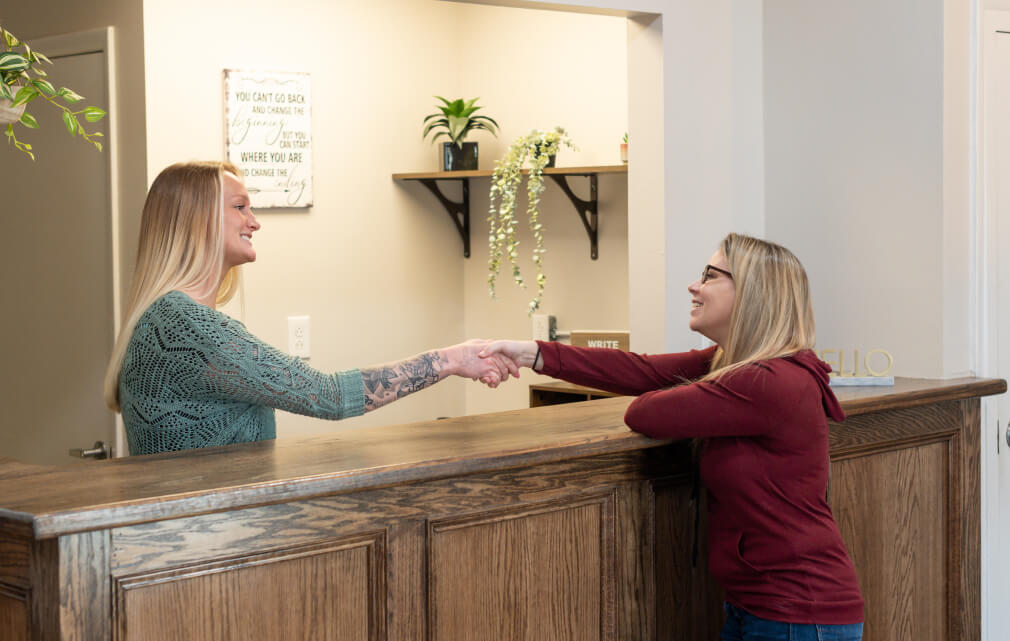Group Therapy
Explore how our supportive group sessions and tailored programs can lead you toward lasting recovery and a brighter future.
Addiction therapy in the group setting has proven beneficial since its introduction in addiction therapy. Harmony Ridge Recovery Center is also one of the drug and alcohol treatment centers in West Virginia that deploy group therapy for addiction. We see addiction recovery as a wholesome experience and an opportunity for struggling individuals to reconnect with themselves and others. Our group therapy sessions take place in a calm and supportive environment where you or your loved one is free to express themselves.

Enlisting the help of a substance addiction treatment program is a significant step toward recovery, one that entails considerable strength. The thought of coming face to face with your demons and transforming your lifestyle in extraordinary ways may bring about various emotions, including hope, anxiety, and possibly fear. One of the most anxiety-provoking perspectives of substance addiction treatment for most is the therapy process. It’s natural to feel some resistance to the possibility of exposing your soul to a foreigner during counseling or individual therapy.
What is Group Therapy for Addiction?
Addiction group therapy is a particular form of counseling that is practiced in treating behavioral disorders, including substance use disorders. It typically requires regular sessions where one or more therapists will work with numerous patients who are being treated for substance abuse. Many individuals can benefit from peer support throughout addiction group therapy during various levels of care.
Members in addiction group therapy will take turns discussing their feelings, struggles, and goals. Addiction group therapy can be tailored to a particular recovery topic, like how to identify and avoid triggers or how to handle other complicated interpersonal relationships. Even more intimidating is the idea of addiction group therapy, which is an essential part of most substance addiction treatment programs. While both group and individual therapy forms are intended to help patients gain insight, learn coping skills, and learn how to work through challenging problems, addiction group therapy has several benefits that complement individual therapy.
The Importance of Group Therapy
Group therapy has long played an essential role in the treatment of substance use disorders. While it might seem frightening, challenging, and even painful to participate at first, most members realize that group therapy is beneficial. One benefit of addiction group therapy is being surrounded by a group of peers who can relate. Members also share their struggles while receiving support and celebrating with each other on their journey to recovery.

Addiction group therapy provides a residential treatment setting that becomes more productive in the treatment process. Studies show that inpatient addiction group therapy helps patients overcome their addiction by focusing on treating withdrawal, anxiety, and depression. People in outpatient programs become less likely to complete treatment, usually due to a lack of motivation. Knowing a patient’s motivation to change at the beginning of addiction treatment is essential in predicting whether they’ll recover.
Addiction Group Therapy Settings
Forms of addiction group therapy are usually offered in a variety of settings which include:
- Community centers
- Hospitals
- Mental health clinics
- Private practice settings
Addictions Treated by Group Therapy:
- Alcohol
- Antidepressants
- Depressants
- Hallucinogens
- Opioids
- Prescription pain medication
- Stimulants
- Street drugs
- Tobacco or nicotine
Unique Aspects of Group Therapy
The group therapy process allows members to benefit from their communications with other group members, along with the interaction and input of the therapist. During individual therapy, members might question if the therapist has ever walked in their shoes and can understand what they are truly going through. In addiction group therapy, patients will have at least one thing in common with their peers in the group: substance or alcohol use disorder.

Another unique element of addiction group therapy is that the group itself represents a small duplicate of each other’s lives in the world outside of treatment. In other words, each individual’s strengths and weaknesses are exhibited over time in the group setting. For example, if a group member gets defensive in response to constructive input, that struggle will resurface during the addiction group therapy process. This provides an excellent opportunity for group members to work on challenges in a secure setting. And as always, they are working with the help and support of their peers.
What to Expect During Group Therapy
Group therapy sessions may be open or closed. Open, meaning brand-new members can join at any time, or closed, meaning that the group members remain the same from start to finish. Open groups can be continuous, with no specific beginning or end date, while closed groups are generally composed for a predestined number of weeks or months. Outpatient therapy groups are regularly closed groups, while inpatient and residential group sessions are usually open groups.
Therapy groups can be led by a singular therapist or co-led by two therapists. The therapists must be licensed and have experience doing addiction group therapy. The role of the therapist will be to set and augment group therapy guidelines and rules, lead the group discussions, and ensure the atmosphere is healthy and productive for all members. The group therapist will ask questions, encourage cooperation, give feedback when needed, and observe how members interact within the group. The principal goal is to help all members benefit in a way that leads them closer to achieving their individual therapy goals.
The Importance of Confidentiality in Group Therapy
Confidentiality is an integral part of addiction group therapy. For everyone to feel safe with opening up in addiction group therapy, all participants must honor the privacy of everybody in the group. Depending on the treatment environment, a group rule might be that participants refrain from communicating with each other outside of the group environment. But equally, everybody is actively involved in the group.
Group therapy sessions usually proceed between one and two hours. The more extended length of the group session can help ensure that everybody has the chance to contribute to group discussions. The size of the group can vary, but usually, the groups will have between 5 and 10 members at once. Too few or too many members could negatively influence the group process.

In an outpatient setting, group therapy sessions usually meet only once weekly. In an intensive inpatient treatment setting, residential, and partial hospitalization setting, addiction group therapy sessions may be conducted two or three times per week.
Benefits of Group Therapy
Below are some of the unique benefits of addiction group therapy include.
A sense of belonging
Individuals suffering from alcohol or substance use disorders usually become isolated from friends, family, and the world in general. Their substance use strains their relationships and could even cause irreversible damage. Addiction group therapy allows these people to experience a feeling of connection and belonging that was missing from their lives. The recognition that they’re not alone in this struggle helps to ease their feelings of isolation, which will allow for healing and positive transformation to occur.
Support system
A top influential benefit of addiction group therapy is the opportunity for members to support each other and contribute helpful feedback based on their personal experiences. Both the one offering support and the one receiving it will benefit from this exchange. The ones providing support become empowered by recognizing they have something helpful to offer their peers. This also improves their self-esteem, which plays an essential role in maintaining sobriety. Receiving support allows group members to realize that it’s okay to accept help from others and often inspires them to support others moving forward.

Discovering new ways of interacting
Addiction group therapy members will learn proper ways to interact with other members and with the group leader. Since therapy groups are a microcosm of everyone’s outside life of the group, dysfunctional patterns of connecting to others will ultimately surface. A therapy group is a safe place for members to practice new ways of communicating and start creating new relationships with other members.
Improved communication skills
Addiction group therapy provides a safe setting to exercise communicating in a positive, open, honest, and respectful way. For many members, this may be an entirely new activity for them. Members can practice offering and receiving productive feedback without being offended.
Variety of Perspectives
Addiction group therapy enables members to discover different perspectives rather than just the advice of their therapist. This gives them a chance to consider various ways of looking at themselves or a situation in which they’ve struggled with. Recognizing there are multiple ways to look at something helps to enhance their problem-solving skills. It also allows them to acknowledge and move on from old perspectives that might have caused barriers in their lives.
Feedback from Peers
One of the most beneficial aspects of addiction group therapy is the chance to receive feedback from peers. Often, members will be more open to the feedback they get from other members than to the information they get from their therapist. This is mainly due to the thought that other group members can relate to their struggles more quickly than their therapist can.
Hope for a Better Future
Living with a substance use disorder leaves people feeling helpless and lost, with little hope that they can feel content again. Addiction group therapy allows members to observe others who are creating positive changes while improving themselves. Group members can also celebrate victories and support one another during challenges or setbacks. This can produce a strong sense of hope that fuels the addiction recovery process.

Building Relationships and a Support System
It’s common for group members to develop a bond with other members. These new friendships provide a source of support and encouragement long after treatment, which increases the probability of long-term sobriety.
Types of Group Therapy Models Used
A model of 5-group therapy is both a useful and common form of substance abuse treatment. This type of group is led by a group of licensed therapists and includes the following five kinds of groups:
- Psychoeducational groups concentrate on anger management and feelings, prevention, conflict resolution, trauma, culture, health and wellness, and family roles.
- Cognitive-behavioral groups concentrate on anger/feelings management, relapse prevention, early recovery, conflict resolution, and building new skills.
- Skills development groups concentrate on identical factors as the cognitive-behavioral group, along with meditation, life skills training, and relaxation training.
- Support groups concentrate on trauma, culture, spirituality, gender-specific topics, relapse prevention, and gender-specific topics.
- Interpersonal process group psychotherapy concentrates on humanistic/existential topics, psychodynamics, trauma, and different forms of abuse.

Additional forms of addiction group therapy include:
- Specialized substance abuse treatment groups: These are similar to 12-step programs. They also include psychodrama, marathons, expressive therapy, ceremonial healing practices, expressive therapy, and gender-specific topics.
- Relapse prevention treatment groups: These groups concentrate on implementing continuous support, addiction education, skills development, and cognitive behavioral therapy.
- Communal and culturally specific groups: These offer community support, along with culturally based activities and topics.
- Expressive groups: These concentrate on various forms of therapy, including dance, drama, and art.
Group therapy and rehab programs at Harmony Ridge
At Harmony Ridge Recovery Center, you can find the kind of substance abuse treatment WV you or someone you wish to help require. In addition to medically assisted detox, our facility ensures much-needed psychotherapy to treat the root cause of addictions and help patients face the psychological factors behind their addiction. Besides one on one therapy, we put a lot of emphasis on group therapy for addiction as an effective aid to all kinds of addiction treatments. The group setting at Harmony Ridge allows you to share your experience and connect with others who happen to be on the same journey as you. It’s truly uplifting to see others progress while receiving the same in turn.

You may choose either residential rehab or partial hospitalization:
- Inpatient rehab (residential) – Entering inpatient drug rehab in WV means living in a facility for a minimum of 30 days. During that time, your needs and schedule are handled by facility staff 24h. An inpatient program is the most effective, particularly due to the absence of distractions. The entire time spent at the facility is dedicated to recovery only.
- Outpatient rehab (partial hospitalization) – If you happen to have a family or other obligations to take care of, an intensive outpatient program West Virginia rehab centers provide might be a better solution.
Addiction treatment for hard drugs
Prolonged drug abuse involving hard drugs like cocaine, meth, and heroin leaves long-term consequences – physically and mentally. However, recovery is possible with the right set of treatments offered at Harmony Ridge:
- Cocaine addiction treatment – Our cocaine rehab West Virginia program involves psychiatric assessment, psychotherapy, and group sessions maximum of 10 members.
- Heroin addiction treatment – Harmony Ridge also operates as an effective West Virginia heroin rehab center where patients are guided to long-term sobriety through medical treatment and individual/group therapy sessions.
- Fentanyl addiction treatment – We are one of the fentanyl rehab centers that implement an array of treatments and therapies, including group sessions.
- Meth addiction treatment – If you seek meth rehab center West Virginia residents highly recommend, look no further than Harmony Ridge.
Ambien rehab
If you seek Ambien rehab for yourself or your loved one, don’t hesitate to reach out to us at Harmony Ridge.
Barbiturates rehab
Addiction to barbiturates can have a fatal outcome if not treated on time. Therefore, we invite you to learn more about barbiturates rehab at Harmony Ridge.
Stimulants rehab
Let us know if your loved one experiences painful withdrawal symptoms due to prescription stimulants. Our stimulants rehab program treats addiction to prescriptions such as Adderall and other medications.

Benzodiazepine rehab
Harmony Ridge belongs to benzodiazepine rehab centers that use group therapy sessions to help patients’ recovery journey.
Opiate rehab
We also work as an opiate rehab center and apply a wide range of therapies:
- pharmacotherapy
- individual therapy sessions
- group therapy for addiction
Marijuana rehab
Psychosis and impaired motor skills stem from long-term abuse of marijuana. Hence why we offer a marijuana rehab west Virginia program to treat the negative physical and mental consequences in patients.
Harmony Ridge rehab programs treat mental health disorders together with addiction to substances
Our rehab programs involve Dual Diagnosis for patients who suffer from mental health struggles and addiction at the same time. Thanks to psychiatric assessment and a customized rehab program, we successfully treat both of them. At some point during rehab, patients join group therapy sessions with others who are also on the path to recovery.
You can benefit from our Aftercare treatment after you complete a rehab program
In order to help you remain sober after rehab, we offer to curate a unique relapse prevention plan and therapy sessions. These are the ways you can benefit from our Aftercare program:
- You’ll learn how to cope successfully with cravings and triggers.
- It will be easier to handle daily stress through healthier coping mechanisms you learn during therapy.
- Self-care becomes a habit.
- It’s possible to achieve long-term sobriety.
Get Help Today at Harmony Ridge
If you or a loved one suffers from substance abuse, now is the time to get them back to a healthy lifestyle. Our treatment specialists here at Harmony Ridge Recovery Center have the tools and experience to help end addiction for good.
Furthermore, our group therapy for addiction is there to help you resocialize without pressure and build a support system through each session. During either inpatient or outpatient rehab, our team will be at your disposal. Whether it’s your first time in treatment or you just need some questions answered, contact us today for a free consultation.
Contact Us TodayFAQ
Is group therapy widely applicable?
Group therapy is widely implemented in different institutions: community centers, hospitals, mental health clinics, private practice settings, etc.
What are the benefits of group therapy?
Group therapy sessions create a sense of community within a supportive environment.
Is group therapy a part of outpatient rehab?
Yes, group therapy is also a part of outpatient rehab.
Does group therapy entail confidentiality?
Yes, it does. Confidentiality is an important part of addiction group therapy, end each member must respect it.
Jump To Section
Begin Your Journey to Healing Here
Ask me about recovery, I can help you!
Our recovery specialists are standing by 24/7 to help you or your loved one.
Or call us: 


